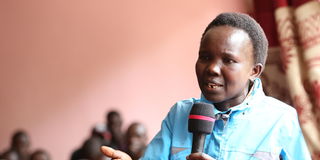GBV perpetrators must be brought to book

Sarah Yano, a marathoner, speaks during the Athletics Kenya National Consultative Forum held in Kapenguria, West Pokot County on November 30, 2021.
What you need to know:
- The move by the sports ministry to organise a conference to discuss this matter in depth is very encouraging
- One hopes that there will be no glossing over issues during the three-day GBV in Sport conference that opens in Kwale on Monday
- Participants of the conference must learn from this precedent and spare us more attempts to 'innovate' a way out of this problem
In Greece this week, a former sailing coach accused of raping a child went on trial 11 years after committing the crime. Triantafyllos Apostolou, 39, was arrested in January 2021 after the girl, an Olympic champion, spoke out about her experience of sexual abuse and effectively kickstarted Greece’s #MeToo movement in Athens.
In his lame defence, Triantafyllos said that the girl had been older than 11 (as if it matters) and that he had been keen to marry her until the case emerged. He remains in pre-trial detention until the determination of his case. Serves him right.
The trial, which is a breakthrough in the sports realm considering the fact that so many coaches across the globe go scot-free after defiling female athletes, comes at a time when Kenyan athletes have been forced to confront the issue of Gender Based Violence in sport following the death of Olympian Agnes Tirop and three other female athletes last year.
Which is why the move by the sports ministry to organise a conference to discuss this matter in depth is very encouraging. The various focus group discussions held across the country since October last year have revealed, nay, confirmed, that intimate partner violence is not the only problem afflicting female athletes. This demographic also faces rape by their coaches and older athletes, abuse by rogue agents and managers, being forced to drop out of school or abandoning their careers after being married off too early, among many other issues. Some are even forced to give out entire amounts of their hard earned prize money to their husbands “to avoid emasculating them”.
One hopes that there will be no glossing over issues during the three-day GBV in Sport conference that opens in Kwale on Monday. In developed countries, women are required to have (and are often given for free) items such as hairspray to aim at the eyes of perpetrators and rape alarms for use in times of danger. There is even a women’s safety app backed by the government, created in response to last year’s huge outcry about violence against women.
The app tracks users’ journeys home and alerts immediate kin in the event that a woman fails to reach a certain destination by a given time. Yet none of this has done anything to solve the underlying problem of misogyny.
Now, the rape alarms, sprays and apps, relics of another failed brainstorming session, have majorly been consigned to many a woman’s drawers, gathering dust, leaving girls and women where they were before. Participants of the conference must learn from this precedent and spare us more attempts to 'innovate' a way out of this problem. GBV is an issue that demands widespread structural change.
Provision of psycho-social support for survivors of GBV, establishment of economic empowerment programmes, improving communication skills among couples, encouraging community leaders to change unfair gender norms. better training for the police and those who provide medical and legal support for survivors of violence, and formulation of more stringent policies are examples of interventions we hope will emerge from the conference. Otherwise we shall remain in this quagmire, where we have always been since the dawn of time—just rolling the dice, hoping to live.




